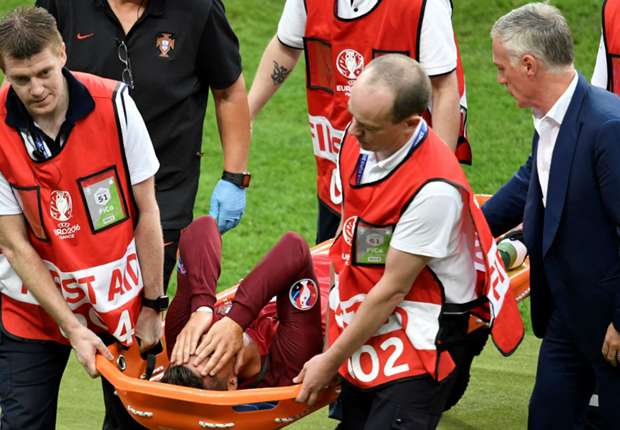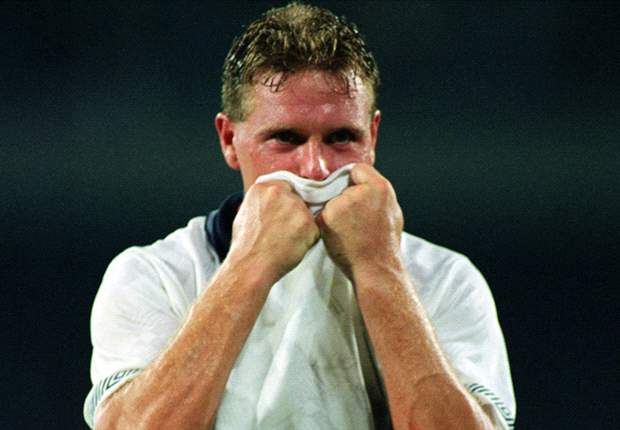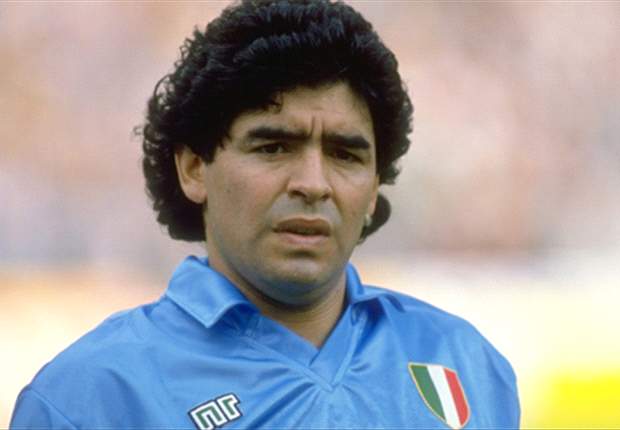
The Portugal captain was inconsolable after being
forced off in the Euro 2016 final with a knee injury, but he is not the
only one to have shown raw emotion on the pitch
Sometimes it can be frustration boiling over at an inept performance or things just not going your way. Other times it can be returning to your spiritual home only to be overcome by love and emotion. On occasions, it can be an injury robbing you of everything you worked hard for.
The latter was certainly the case on at the Stade de France as Cristinao Ronaldo broke down as the realisation he would be forced out of the Euro 2016 final after just 25 minutes came over him. The Portugal captain injured his knee early on and after two periods of treatment was forced to admit defeat.
But Ronaldo is not the first footballing figure to cry - Sportmasta takes a look at some other famous instances from the past.

Gazza's tears
In arguably the most famous show of emotion ever witnessed on the pitch, England midfielder Paul Gascoigne wept in the centre of the Stadio Delle Alpi as the realisation sunk in that he would miss the 1990 World Cup final.
With England's semi-final versus Germany locked at 1-1, the then-Tottenham midfielder threw himself rashly into a challenge on Thomas Berthold and was promptly booked by the referee. The caution meant that if his side progressed, he would be suspended from the biggest match in football. His crumpled expression became one of the abiding memories of the tournament, but his team exited on penalty kicks in any case, and Germany went on to be crowned champions.
Romario's anguish
After his goals fired Brazil to glory in World Cup '94 in USA, the legendary striker was seen as a perfect supplement to the genius of Rivaldo and a 21-year-old Ronaldo as the Selecao looked to retain their trophy.
However, the prolific frontman sustained a muscular injury in the build-up to the tournament, and faced a race against time to recover and be included in Mario Zagallo's squad. The 32-year-old's weary legs had lost their healing powers, however, and a day before the Selecao's team for the tournament was announced, Romario dissolved in a flood of tears when the realisation struck that he would play no part in the festival of football in France.
Ronaldo's injury woes
The brilliant Brazilian was unquestionably the best player in the world when serious injury first struck the knees of Il Fenomeno during his time with Inter. In November 1999, he was forced out of action for six months, but made a recovery against Lazio in the Coppa Italia in April of the following year.
But disaster struck. Ronaldo's knee collapsed from underneath him on the Stadio Olimpico turf, prompting the striker to scream in agony as he clutched the injured limb. Tears flowed as he was stretchered off, and despite going on to win the World Cup in 2002 and feature for Real Madrid, some argue that the prolific goalscorer was never quite the same again. The enigmatic figure let his emotion get the better of him again years later, when he officially announced his retirement from the game in 2011.

The city of Rome makes Maradona weep
Italy in 1990 was, for a month, the centre of the footballing universe. The hosts faced Argentina in the semi-finals of the World Cup, with an uncontainable air of expectancy sweeping across the nation. However, the South American side, with Napoli star Diego Maradona playing in front of the fans that adored him at the Stadio San Paolo, emerged triumphant.
The crowd that evening might have held aloft a banner saying, "Diego, we love you, but Italy is our father," but in the final in Rome the diminutive genius received an altogether more racuous reception. As Germany defeated his beloved nation 1-0, fans of the eliminated Azzurri jeered him as he collected his runners-up medal. Maradona was already crying, however, as the famous trophy had slipped through his fingers.
Kuffour devastated by last-minute drama
The 1999 Champions League final has achieved immortal status in the annals of history thanks to Manchester United's two goals in injury-time that helped to defeat Bayern Munich at Camp Nou. But while Red Devils relish in the memory of that evening, there are as many Bavarians who wake up with a cold sweat at the thought of Ole Gunnar Solksjaer's big toe poking home the winner.
As captain and club legend Lothar Mattheus rested on the bench, thinking his work done, his team snatched defeat from the jaws of victory. The reaction of Germany was summed up by FCB defender Samuel Kuffour, who, upon the concession of Solkjaer's goal, began beating the turf in anger, before his frustration turned to despair as the agony of the incident finally hit home.
The fragile feelings of Franco
Despite his reputation as one of the most uncompromising but utterly incomparable defenders of all time, AC Milan's Franco Baresi let his mask slip on more than one occasion in order to express the magnitude of the situation.
His missed penalty against Brazil in World Cup 1994, the last act in his career for Italy, rendered the normally reserved stopper inconsolable. Then in 1997, upon playing in his final match for the Rossoneri, Baresi issued a farewell to the San Siro audience that had adored him for two decades, and the thought of leaving the pitch for the final time proved too much for him to take. Even Silvio Berlusconi, the club's ruthless owner, was visibly moved by one of the game's true greats departing into the sunset.
North Korean patriotism
The Asian nation were regarded as one of the rank outsiders of World Cup 2010, particularly when drawn in a section that contained Portugal, the Ivory Coast and Brazil. Their first match of the tournament was against the latter, and as the players from both sides lined up for the contest, one individual allowed the playing of the North Korean national anthem to get the better of him.
As the song resonated in the arena, tears of joy streamed down the face of striker Jong Tae-Se as the camera panned along the players, allowing a viewing audience of close to one billion to share in his adulation at appearing on the world's biggest stage. The boy born in Japan, who had fought for the right to North Korean citizenship, was representing his adopted nation at the World Cup, and his emotion conveyed how delighted he was to be there.
Nedved and Ballack booked and banned
As Gazza had shed tears despite his nation failing to reach the World Cup final in 1990, Germany international Michael Ballack picked up a caution in the 2002 semi-final against South Korea - then set about making sure the rest of his team-mates could enjoy the showpiece occasion.
Four minutes after watching the referee raise the yellow card that ruled him out of a final meeting with Brazil, Ballack bravely struck the winner, and only after the match had ended did the realisation strike the playmaker that he would be denied from taking part.
Similarly in 2003, Juventus' Pavel Nedved knew that he would be banned from the Champions League final if the Turin giants progressed past Real Madrid, shortly after smashing home a stunning goal to take his team to a meeting with AC Milan. He collapsed, distraught.
Palombo's outpouring of grief
In May 2011, Sampdoria were consigned to Serie B after a home defeat to Palermo, and club captain Angelo Palombo was rendered inconsolable by the defeat, and in a moving tribute to the club's followers, he addressed each stand in the stadium in turn and applauded supporters for their efforts.
Through every step the committed midfielder took he grew more and more emotional, with eyes reddened as he saluted the fans who had remained behind. This wasn't an off-the-cuff reaction to a defeat, but a culmination of a horrible season for the Genoa team, that the skipper had done everything in his power to avoid. Had his president Riccardo Garrone been as desperate to retain Antonio Cassano and Giampaolo Pazzini as Palombo was to remain in Serie A, the situation may not have arisen.
Teenage Pele's moment of joy
Countless players and coaches have burst into tears after collecting some of football's top prizes, but few have expressed their triumph so poignantly and as fittingly as an impressionably young Brazilian forward in 1958.
Soon to be known as one of the game's greatest ever players, a 17-year-old Pele burst onto the scene in the World Cup in Sweden, and his efforts culminated in a pair of stunning goals in the final against the host that gave the Selecao their first ever crown. Pele was then thrust upon the shoulders of his team-mates and paraded around the pitch, with the player unable to contain himself nor appreciate the gravity of his actions. A star was well and truly born on that afternoon.
No comments:
Post a Comment